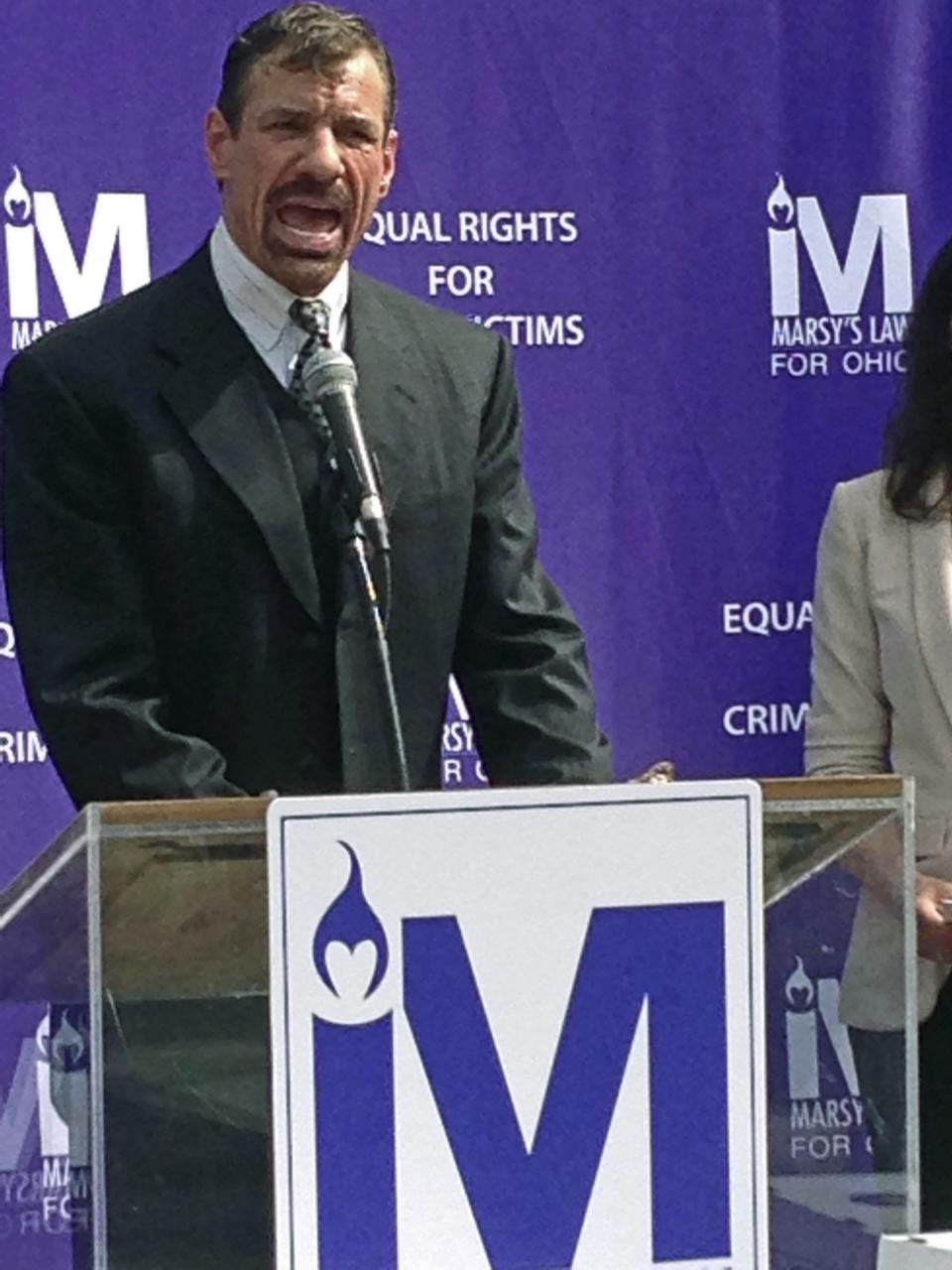Keeping secrets: Ohio moves to block more court records, spending from view

It’s about to get harder for Ohioans to see what their government is up to.
In a series of under-the-radar actions, state lawmakers are considering or have approved some of the most significant changes to Ohio’s open records laws in years.
Taken together, those measures put new limits on the public’s right to know about crimes, evidence gathered by police, court proceedings, investigations of public officials, the work of the coroner’s office and spending by a nonprofit that controls half the state’s $2 billion opioid settlement.
Those who support the changes describe them either as minor tweaks to existing law or as necessary steps to protect crime victims and criminal investigations.
Those who oppose them say they threaten a fundamental American right: The right to know how the government wields its power.
“It doesn’t make any common sense, other than a desire to hide things,” said Fred Gittes, a Columbus attorney who handles open government and First Amendment cases.
The debate over government secrets, privacy and the public’s right to know is as old as the republic. Disagreements over what should – and should not – be available for all to see have raged from the Founding Fathers to the Cold War and beyond.
Those arguments intensified in recent years as Americans clamored for more government transparency about the COVID-19 pandemic and a criminal justice system dealing with high-profile cases of misconduct by police and politicians.
“Transparency has gone mainstream,” said Joseph Foti, chief research officer at the Open Government Partnership, an international nonprofit that advocates for more openness in government. “Now we’re discussing who and what should be transparent.”
In Ohio, that discussion has led to proposals to make government less open.
If lawmakers approve all the changes they’re considering, the public might no longer see the kind of audits and records that exposed corruption at Cincinnati City Hall in recent years. They could lose access to autopsy reports and body camera footage that has revealed details about fatal shootings involving police officers. And they wouldn’t be entitled to documents related to hundreds of millions of dollars in spending.
Already, police and court clerks are stripping the names of crime victims from their records to comply with a victim’s rights measure known as Marsy’s Law.
“If this information has to be hidden, it’s going to be tens of thousands of cases,” Hamilton County Clerk of Courts Pavan Parikh said of Marsy's Law.
Louis Tobin, executive director of the Ohio Prosecuting Attorneys Association, supports the changes related to the criminal justice system and said he doesn’t share the concerns of First Amendment lawyers, journalists and others who worry they go too far.
Some secrecy is necessary, he said, to keep victims safe and to allow police and prosecutors to effectively do their jobs.
“What we’re doing here isn’t earth shattering,” Tobin said.
A small change with big implications
That’s not how Gittes sees it. The change that most concerns him is one paragraph buried in the state budget, which lawmakers are expected to vote on later this week.
“I was astounded when I looked at it,” he said.
The proposed change would create a new, broader definition for the “specific investigatory work product” of police and other investigators. Under existing law, that work product is generally understood to mean police notes and related material that does not have to be immediately disclosed to the public.
The new definition, however, includes almost anything that could become part of a criminal investigation, including material that otherwise would have been public. And it sets no time limit for when, if ever, the material could be made public.
Documents, evidence, lab results, autopsy reports, interviews, witness statements and other material all could now be off limits. Even findings by civilian authorities, such as audits or ethics investigations, could be hidden if they become part of a criminal investigation.
“We’ve never considered publicly available records to be part of the investigatory records,” said Jack Greiner, a Cincinnati attorney who represents The Enquirer and other media organizations.
“There’s really no good reason why this shouldn’t be available.”

The Ohio Department of Public Safety requested the change in the budget plan offered by Gov. Mike DeWine. When asked why, a department spokesman said only that it was intended to clarify the meaning of investigatory work product.
Tobin said the intent is to protect the integrity of criminal investigations, not to hide important information. He said investigations can be compromised if too much information is made public too soon.
“We’re trying to protect victim and witness information from premature disclosure,” Tobin said.
Gittes, though, said material that could help prove a defendant’s innocence or shed light on a police shooting now could be blocked from public view.
“That tells me how little they think of the public’s right to know,” Gittes said.
'We're talking about a wholesale change'
Tom Roberts, a former state legislator who now is president of the Ohio Conference of the NAACP, said he’s concerned about the impact the new restrictions could have on civil rights and police misconduct cases.
He said he also worries about the way Ohio lawmakers are making the changes. By putting them in the annual budget bill, Roberts said, they can avoid serious debate because everyone is so focused on passing a budget.
“My gut says to me the budget is the last place to put it,” Roberts said. “We’re talking about a wholesale change in public information, which needs to be fully vetted in a public forum.”
Another late addition to the budget would declare the OneOhio Recovery Foundation a private entity, shielding it from public records requests, state ethics rules and bribery laws.
That matters because OneOhio is the nonprofit in charge of more than $1 billion from the state’s settlement with opioid manufacturers and will decide how the money should be spent to address the opioid crisis.
State Sen. Rob McColley, R-Napoleon, serves on OneOhio’s 29-member board and said making the board private is the right move. As a public entity, he said, it would be less efficient and hindered by state regulations.
“It was never intended to be a public agency,” McColley said.
He said the board should be allowed to make its own rules so it can “get the settlement money out quickly.” He also said volunteer members of the board and its regional advisory boards don’t have the time or resources to respond to public records requests.
The effort to make OneOhio private comes weeks after the Ohio Supreme Court ruled that it must allow public inspection of its records. Greiner, the Cincinnati lawyer who filed the lawsuit on behalf of the advocacy group Harm Reduction Ohio, said that’s no accident.
“It’s terrible,” he said. “Really, they’re just thumbing their nose at what the courts have decided.”
Right to privacy vs. right to know
The other major change to Ohio open records law already is a done deal.
Ohio voters approved Marsy’s Law as a constitutional amendment in 2017, but the measure listed a series of victim’s rights that the legislature spent years trying to turn into an actual, enforceable law.
The interpretation of one of those rights – “the right to privacy” – led to a major change in the way police and the courts report criminal proceedings.
From now on, victims of violent or sexual offenses will not be named without their explicit approval. And victims of any crime can choose to withhold their names by notifying police or prosecutors.
The goal is to protect victims and to follow the will of the voters who approved Marsy’s Law almost six years ago, said state Rep. Andrea White, R-Kettering, who helped draft the new legislation.
“The criminal justice system knows the victim’s identity,” White said. “The question is, does everyone else have the right to know when it comes at the cost of the victim’s privacy?”

The state’s interpretation of Marsy’s Law answers that question with a resounding "no." But the redaction of so many names from thousands of police reports and records is a monumental task for police and courts.
To simplify that process, some agencies have redacted every victim name, even if they don’t qualify for automatic redaction under the law. That’s apparently what happened after the fatal shooting of Cincinnati businessman Michael Sweeney in May, when the police report omitted his name and the name of a woman in his car.
Sweeney wasn’t eligible for redaction because he died in the shooting, and the woman in his car later was charged with obstructing the investigation.
“There is some learning curve,” said Lt. Jonathan Cunningham, spokesman for the Cincinnati Police. “I don’t think everyone is doing it one certain way.”
Marsy’s Law also raises age-old questions about balancing privacy with the public’s right to know.
The law is named after a California college student, Marsalee Ann Nicholas, who was killed in 1983 by her former boyfriend. One week later, Marsalee’s mother was confronted by the former boyfriend in a grocery store, unaware he’d been released on bail.
Proponents of the law say stripping records of victims’ names ensures their privacy and protects them from retaliation. Opponents say the state’s new rules gut court records that should be available to the public.
Victims are a crucial part of the court record, they say, and the legal system already allows judges to determine on a case-by-case basis whether a particular victim needs protection or anonymity.
“When the state’s police power comes into play, there’s public interest in that,” Greiner said. “This inhibits that to a great degree.”
Most of the new rules connected to Marsy’s law already are in effect. The other changes, if they remain in the budget, could be approved as early as this week.
This article originally appeared on Cincinnati Enquirer: Public records: Ohio lawmakers propose shielding records from view

